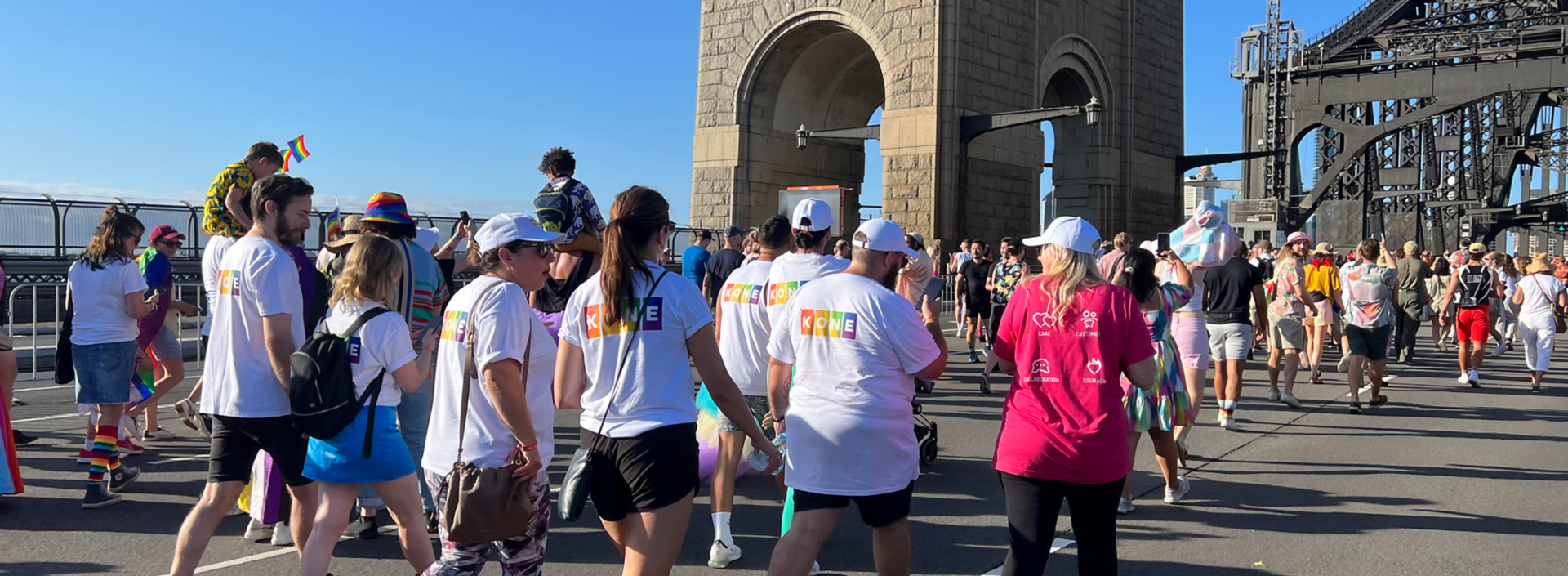What does Pride Month mean to you?
Pride Month means a lot to me, both personally and professionally. On a personal level, it’s a celebration of love, friendship, and the beauty of being unapologetically yourself. It’s about honouring what makes us different, and what connects us. For me, it marks a personal evolution – from hiding who I was to learning to live openly. It’s about shedding shame and embracing pride in the truest sense.
Pride is also a time to honor the past, the present, and the future. Every country has its own evolution when it comes to LGBTIQ+* rights. I feel fortunate to have the rights I do, but I also recognize there's still a lot of work to do in many parts of the world. That’s why Pride matters. It’s about visibility. It’s about educating others. It’s not about just being tolerated, it’s about being accepted. And the “plus” in LGBTIQ+ says it all. If you don’t see yourself in the letters, the plus says you still belong.
*LGBTIQ+ is an acronym that describes various identities within the queer community. It stands for people who identify as lesbian, gay, bisexual, transgender, intersex and queer. The “+” symbol acknowledges other diverse sexualities and gender identities within the community.

Why should companies like KONE celebrate inclusion all year round? What’s your advice for leaders looking to support an inclusive culture?
At KONE, supporting inclusion matters and we attract talent who value belonging. When people feel safe and accepted, they bring their best selves to work. They’re not spending energy hiding or worrying, they’re thriving. I believe inclusive values give us a competitive edge and make us stand apart.
My advice for leaders who want to promote inclusion and belonging are these.
First, live your values. At KONE, courage, care, collaboration, and inclusion, are more than words. When leaders model these, it can create psychological and physical safety. And from that, we get people’s best work.
Second, say it out loud and create inclusive moments. Wish your colleagues a happy Pride Month. A simple acknowledgement can have a big impact. Kick off your June meeting by saying Happy Pride month to all LGBTQ+ colleagues and allies. And throughout the year, build in other moments. Whether it’s Chinese New Year, Black History Month in February, International Women’s Day in March, or Diwali toward the end of the year, make space for learning and celebrating.
Third, create visibility. Invite team members who are comfortable being out to share what Pride means to them. This way you can make inclusion personal, not abstract. It gives others permission to be honest too. You can also join and support Employee Resource Groups like the ones we have at KONE. Be an active ally. Educate yourself. Encourage your team to participate in these groups and learn from them.
How has being part of the LGBTIQ+ community shaped your leadership? Was the commitment to inclusion at KONE something that impacted your decision to join?
Absolutely, yes – I want to say 5,000%.
I’ve been working for over 26 years, and the shift in LGBTIQ+ rights and visibility over that time has been dramatic. In the late '90s and early 2000s, I wasn’t out at work because I didn’t feel psychologically safe. I spent years hiding – editing conversations, playing the “pronoun game,” avoiding questions about my private life. That constant filtering is exhausting and makes authentic work relationships nearly impossible.
Eventually, I realized I didn’t want to work in places where I couldn’t be myself. I also came to understand that representation really matters. People like me, LGBTIQ+ people, need to see leaders who look like them, live like them, and thrive like them. I felt a responsibility to be visible, and that led me to embrace a personal and professional value: courage.
Choosing KONE was very intentional. Inclusion was a driving factor. I can only be me. That’s what I’m best at. And when I’m in an environment where I’m accepted, I can do my best work. From day one at KONE, people have asked about my wife, welcomed her, and embraced me fully. That matters. I use the word “wife” intentionally. It’s my legal right, and it’s part of what we’ve fought for. Equality means using the same language, having the same rights, and being proud of both.

Have you experienced minority stress, and how can workplaces like KONE help ease it?
Yes, I have, but I want to be nuanced in how I talk about it. I belong to minority groups: I’m a woman and I’m part of the LGBTIQ+ community.
That said, when I speak about minority stress, I want to acknowledge both my experiences and the privileges I hold. I’m white and I live in the U.S., and that gives me access and advantages not available to all.
I want people to see me, an executive, a woman, and a wife. I’m also here to say: you’re not alone, and you don’t have to hide.
Can you share a personal story that reflects your views on inclusion?

Throughout the first 18 years of my career, I had never seen a senior female executive who was openly LGBTIQ+. When I finally heard one at work refer to her partner as ‘my wife and I…’, I was moved to tears. Because I saw myself. I realized: I can do this. Afterwards, we talked, laughed, cried, and shared our responsibility to be visible. That moment changed me. Since then, every time I join a team, I introduce myself fully. I say “my wife and I”.
Being who I am makes me stronger also at my work. And if my visibility gives someone else courage to live more authentically, that’s worth everything. That’s why I’m sharing my story now.
